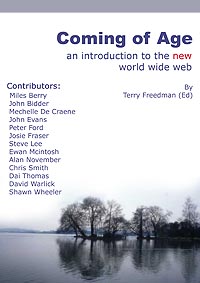Interesting article in the Education Guardian today by Philip Beadle: "Not OK Computer" investigates the use of ICT in schools today. I would say that a lot of what we do in the Geography community does not fall into the categories that he describes, being far more creative and having an impact, but some of you might disagree.
Worth reading the article, which can be seen HERE.
Here are a few brief extracts which could be seen as a challenge to some users of ICT:
"I am still stuck in that hinterland where I think ICT in schools is a great idea (and all that), but am still rendered shame-faced while caught in stock cupboards sniffing books with lascivious intent. The problem with ICT as a panacea, apart from the fact that the stuff it is replacing - books, human contact and language - was so well designed in the first place, is that it's been thrown at us with neither instruction manual nor time to read one if one existed.
As a result, much of ICT use in schools is piss poor, squared. All of us have witnessed some "imported for a twilight session" ICT whizz make the interactive whiteboard sing, clap its hands and perform a pelvis-breaking dance. A select few of us, however, will have translated that training into a single trick. A trick we desperately hope will fox Ofsted into believing that we are anything other than pasty incompetents wearing a none-too-convincing ICT-wizard mask."
Discuss....One way to avoid falling into this category is to be suitably tooled up for the latest developments on the web.
I recommend the free PDF download below, full details of which are on a posting on PETER FORD's blog.

Contents.
1. Preliminary Information
2. The Contributors: Quick Reference Guide
3. Introduction
4. Glossary Of Terms Used
5. Book Review: Redefining Literacy For The 2St Century
6. Effective E-Learning Through Collaboration
7. What Are Rss Feeds And Why Haven’T I Heard About It?(Rss Feeds From An Educator’S Perspective)
8. Blogging: Shift Of Control
9. Photo-Sharing And Clip-Art
10. Factoring Web Logs To Their Fundamentals
11. Virtual Support Via The Blogosphere
12. The International Edublog Awards
13. Blogs You Must Read!
14. Elgg And Blogging In Primary Education
15. Using Blogs In School
16. Thinking About Creativity, Thinking About Blogs!
17. Book Review: Classroom Blogging: A Teacher’S Guide To The Blogosphere
18. Book Review: New Tools For Learning
19. Diary Of A Potential Podcasting Junkie
20. Finding Good Podcasts
21. Podcasting Resources
22. Podcasting
23. Finding And Subscribing To A Podcast Via Itunes
24. Obtaining Information About A Podcast In Itunes
25. Giving Students A Second Listen
26. Podcasting: A Review Of Recording Devices
27. Other Useful Websites
28. Create An Rss Feed For Your Podcast
29. List Your Podcast And Find Others’
30. Podcasting And Wikis
31. Recording A Podcast On A Computer
32. Uses Of Podcasting In Schools
33. Video Blogging: Terry Freedman Interviews Paul Knight
34. Video Blogging In Schools
35. Wikis: An Introduction
36. Wikipedia Vs Britannica
37. Setting Up A Wiki
38. Wikiville: An Interview With John Bidder
39. Social Bookmarking
40. Forums, Instant Messaging And Other Ways To Participate


Comments
I thinkBeadle's article demonstrates that the ICT community has not yet made a fully convincing case for itself.
Good to hear from you.
I shall keep an eye out for the 2nd edition and post here when it's available.
As I said, I think the Geography community is embracing these new Web 2.0 technologies as a way of exploring the new pedagogies and the new geographies that pupils inhabit.
I am involved in an exciting new GA project called Young People's Geographies which I shall post more on as the project progresses.